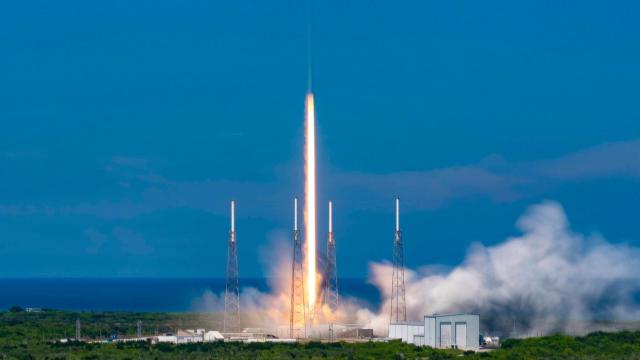In August 2022, SpaceX violated a Federal Aviation Administration safety rule that’s meant to prevent collisions in low Earth orbit, but the proposed fine of $US175,000 ($242,935) will hardly serve as a deterrent for a company owned by one of the richest people on Earth.
And it’s not as if SpaceX violated something trivial in nature. The company failed to submit launch collision analysis trajectory data to the FAA before launching its Falcon 9 rocket on August 19, 2022, according to a February 17 statement.
The rocket, launching from Florida’s Cape Canaveral Space Force Station, successfully delivered the Starlink Group 4-27 payload to low Earth orbit, but SpaceX, like other launch providers, is supposed to submit this data to the regulator a full week before any launch attempt.
The FAA provided Gizmodo with a copy of the enforcement letter, and it states that civil penalties of this type are not to exceed $US262,666 ($364,633) for each violation of federal aviation regulations. After it reviewed the information gleaned from the SpaceX investigation, the FAA is now proposing to “assess a civil penalty in the amount of $US175,000 ($242,935),” the enforcement letter states.
What a joke. SpaceX charges $US67 ($93) million for flights aboard Falcon 9. The Starlink Group 4-27 launch was a company mission, so it was done at cost, but that’s beside the point. SpaceX, a private firm with sufficient amounts of public funding, is doing all right, having performed a record 61 orbital launches in 2022. The FAA should probably factor in these sorts of numbers when evaluating penalties and hit transgressors where it hurts — the pocket book.
“Launch collision analysis trajectory data is used to assess the probability of the launch vehicle colliding with one of the thousands of tracked objects orbiting the Earth,” says the FAA. Under federal requirements, launch providers must submit data to the FAA showing that space-bound objects, namely satellites, have a probability of collision with other objects assessed at less than 1 in 100,000. For crewed vehicles, this figure jumps to no bigger odds than one in a million.
SpaceX did not immediately reply to our request for more information, but it rarely if ever addresses media requests. The company now has 30 days to respond to the FAA’s enforcement letter.
Related article: What to Know About Kessler Syndrome, the Ultimate Space Disaster
As of today, SpaceX has 3,588 functioning Starlink satellites in orbit. The pace at which SpaceX and other companies are launching objects is making it increasingly difficult to track potential collisions in space, an important domain known as space situational awareness. Collisions in space are bad, as they spawn dangerous fragments that go on to threaten other orbiting objects.
It’s estimated that, by the 2030s, tens of thousands of satellites will work in orbit. The full impact of this is not yet known, but the laws and regulations surrounding these satellite constellations are still in their infancy. It doesn’t help when a company chooses to break one of the few rules that does exist.
More: Federal Watchdog Demands Deeper Environmental Reviews of Proposed Satellite Constellations
